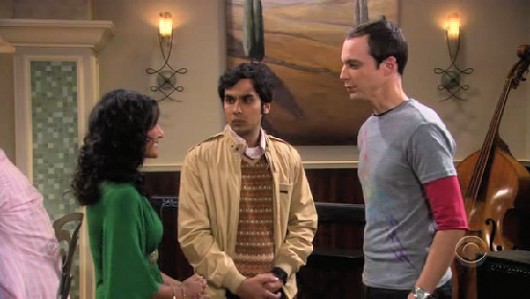Whoever has watched The Big Bang Theory enough should be familiar with the awkward and “adorable” Indian Rajesh Ramayan Koothrapali played by Kunal Nayyar. Grown up in New Delhi, he comes to the United States as an astrophysicist to do research for the California Institute of Technology in the show, and it is in this context that I will analyze him as an Indian American. Despite coming to America for the sake of his science career, it is obvious to the audience that he gradually gets “Americanized” as indicated by the stereotypical characteristics of Asian American men he exhibits as the show progresses.
In the first half of the season Raj plays a relative minor role as part of the main cast of characters. In context with the other “nerdy” and socially awkward members of the show, he blends perfectly within the social dynamic as the character who does not generally speak a lot and has a selective mutism towards women. However, his static character changes in episode 8 of the first season where the main plot of the episode uncovers more about Raj’s personal problems in detail. “The Grasshopper Experiment” introduces audience members to Raj’s traditional Indian parents who video call him and force him to go out on a date with an Indian girl named Lalita Gupta. This scene introduces non-explicitly the concept of Asian American filial piety.
Despite all his objections, Raj is forced to concede to his parent's wishes for him to quickly fall in love with her in time for a “spring wedding.” Sheldon Cooper, also one of the main characters, accurately notes that Raj’s parents' “greater than average participation in their children's love life” is a typical custom of older generation Asians which often cause frustration for the younger generation people living in America, like Raj, who believe they can freely choose a partner suitable to them. David Goetsch, the writer for this episode, plays off this contested Asian American issue to create a comedic storyline, but the important concept to note throughout the episode from the Asian American perspective is Raj’s struggle to try and and balance his parent’s orders with his detached feelings for Lalita. This controversial intrafamilial conflict caused by Confucian filial piety can take on many other forms of domestic obligations and encompassing only a part of the larger struggle for young Asian Americans, not just Raj, to live in America in context of traditional “old world” customs and values.
The episode ends, however, on a less serious note with Raj finding out the only way he can speak to women is if he is sufficiently intoxicated, and the audience finds that after Raj’s disturbing drunkenness, Lalita unexpectedly falls for Sheldon. Despite the humorless Asian American issue that I have identified, it is important to remember that the writers of the Big Bang theory ultimately respond to these sobering social problems with humor and comedy. Thus, it highlights the power comedy has in informing audiences of such issues in a social context. Although they are not serious, sitcoms like The Big Bang Theory allow anyone to perceive and understand problems in an easier and digestible way not unlike receiving the general context of the show despite all the scientific and "nerdy" jokes the comedy dishes out.
Watch the scene on youtube here:
Be sure to comment below! I would like to hear your thoughts whether in agreement or disagreement! I think it is important to discuss these even in the context of speaking about comedy shows!


Raj displays signs of being “Americanized” by being confused about arranged marriages, and expecting that he is completely free from his parents. And that’s one of the sources of his frustrations. He is thousands of miles away from his overbearing parents…and yet, they still control facets of his life thanks to the power of broadband. He tries to voice his concerns, only for his parents to run them over. That’s why he seems so desperate to have little contact with them. One example can seen when he tries to get away with a speedy goodbye, only to pull on exasperated face when his dad tells him to wait because of “good news.” Another Asian American stereotype (that frustrates Raj) is stated by Raj’s father: “We want grandchildren.”
ReplyDeleteI think another reason the show’s writers chose to portray this Asian American issue using humor is that no one would be interested in watching the show if said issue was portrayed in a serious or moody way. The writers used humor in an effective way by having it pull in the viewers, thus making the audience want to see more. But it isn’t too much to the point where it hides the problem at Raj’s hand; rather, it brings the issue out into the spotlight in a comedic way (albeit at Raj’s expense).